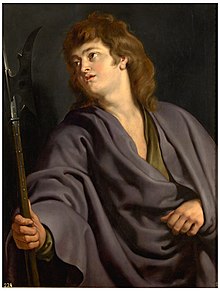
Back Sant Mateu apóstol AN Mattheus se Godspellere ANG متى Arabic ܡܬܝ ܡܟܣܐ ARC متى ARZ Həvari Matfey Azerbaijani Matthäus (Apostl) BAR Матфей (евангеліст) Byelorussian Мацьвей (апостал) BE-X-OLD Матей (евангелист) Bulgarian
Matthew the Apostle | |
|---|---|
 Saint Matthew (c. 1611) by Peter Paul Rubens | |
| Apostle, Evangelist, and Martyr | |
| Born | Capernaum,[1] Galilee, Roman Empire |
| Died | 1st century (believed around year 68) AD Ethiopia |
| Venerated in | |
| Canonized | Pre-Congregation |
| Feast |
|
| Attributes | Angel |
| Patronage | Accountants; Salerno, Italy; bankers; Osorno, Chile; tax collectors; perfumers; civil servants[3] |
| Major works | Gospel of Matthew |
Matthew the Apostle (Saint Matthew)[a] (Koine Greek: Ματθαῖος, romanized: Matthaîos; Aramaic: ܡܬܝ, romanized: Mattāy) is named in the New Testament as one of the twelve apostles of Jesus. According to Christian traditions, he was also one of the four Evangelists as author of the Gospel of Matthew, and thus is also known as Matthew the Evangelist.
The claim of his gospel authorship is rejected by most modern biblical scholars, though the "traditional authorship still has its defenders."[4] The New Testament records that as a disciple, he followed Jesus. Church Fathers, such as Irenaeus and Clement of Alexandria, relate that Matthew preached the gospel in Judea before going to other countries.
- ^ Easton 1897.
- ^ S. Swayd, Samy (2009). The A to Z of the Druzes. Rowman & Littlefield. p. 109. ISBN 978-0-81086836-6.
- ^ Cite error: The named reference
stmatthewscathedral.orgwas invoked but never defined (see the help page). - ^ Allison 2010, p. 27.
Cite error: There are <ref group=lower-alpha> tags or {{efn}} templates on this page, but the references will not show without a {{reflist|group=lower-alpha}} template or {{notelist}} template (see the help page).